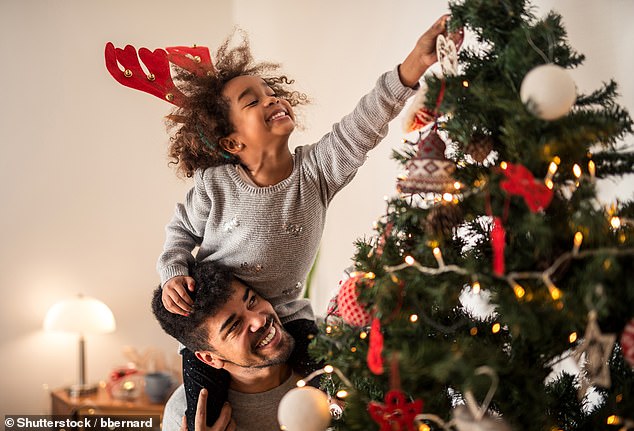Scientists reveal psychology behind why Christmas really DOES feel special
The holidays have arrived, and with them the feel-good emotions that only this time of year can bring.
As Christmas music blares from store speakers and neighborhoods sparkle with bright lights and festive cheer, experts reveal that it's more than just a coincidence that the holidays have a drastic impact on how you feel.
Researchers in Norway say a 'Christmas spirit network' is activated in the human brain when participants view Christmas-themed images.
There is a 'Christmas spirit network' in the human brain that produces euphoric feelings during the Christmas season
The studypublished in the BMJ journal, focused on 26 participants split into a 'Christmas' and 'non-Christmas' group and found that the sensory-motor cortex, which controls the bodily senses, lit up for those who were positively associated with the holiday.
Dr. Rachel Goldman of New York University, who was not involved in the research, told Dailymail.com: 'If someone has fond memories of growing up with family traditions and it was a joyful time of year for him or her, then it would most likely translate to later in life, and this time of year would bring back those memories and feelings.”
“It all comes down to associations and what our brains think the holidays mean, and that's different for each individual because we all have different experiences.”
Positive reinforcement is something Goldman says she sees in her clients, especially during the holidays.
“A person can have a positive experience, such as childhood memories full of joy, gifts, baking cookies together, … and then the thought of going home and/or the holidays can immediately evoke a feeling of happiness, joy, etc.,” Goldman said.
“The same/similar emotions they had as children at that time,” she said.

Childhood memories often influence the way we view the holidays as adults, eliciting a positive or negative trigger-based response
These experiences are defined as classical conditioning, a process in which behavior is learned when a neutral stimulus, such as Christmas, is associated with a positive memory.
Russian physiologist Ivan Pavlov first discovered classical conditioning in the late 1890s after discovering that ringing a bell every time he fed a dog caused the dog to salivate when it heard the bell, even without that he was fed.
Feelings of euphoria at Christmas work the same way, said Dr. Krystine Batcho, professor of psychology at Le Moyne College in Syracuse, New York in 2019.
She continued, “Adornments are a symbol of a marker in time.”
“In our childhood, or in our younger years, those decorations were followed by good things, like family gatherings, good food, exchanging presents – all kinds of wonderful, joyful things.
'Classical conditioning gives these decorations the property of improving our mood.'
Each memory triggers a trigger, causing the brain to respond by releasing hormones and chemicals that create a state of arousal.
This means that every memory, good or bad, acts as a trigger and tells the brain how to react when the person is in a similar situation.
Not all Christmas-related memories are good, and many people enter this time of year with negative triggers that make them want to skip the holiday altogether.
“Something to keep in mind is that a trigger is anything that provokes an intense or unexpected emotional response,” Goldman said, adding that common triggers stem from negative memories or trauma.
Goldman said she often hears her clients say they have predisposed anxiety heading into the holidays, usually because of comments from family members and questions about their eating habits, weight, shape or size.
These past experiences make the holidays a stressful time and they are already anticipating the same kinds of comments and questions for the next visit.

It is possible to flip the script on your emotional response to the holidays by creating new, positive memories
However, negative triggers are never set in stone, and it is possible to flip the script on those triggers and emotions.
“It's important to remind readers that this is not easy, but it is not impossible either,” Goldman said.
Changing the way we think is like any other habit: it takes time and practice.
People can change the way they respond to the holidays by creating new memories and positive experiences or through self-affirmation.
“I often say that our self-talk becomes our reality,” Goldman said.
'…The more we tell ourselves something, or the more we hear something through external messages, we eventually internalize it and believe it.'
The memories and attachments associated with the holidays can have you running at full speed away from or embracing the festive merriment, singing “Deck the Halls” into the new year.
